Collin County constable featured on leaked list of Oath Keepers members, report says
COLLIN COUNTY, Texas - Collin County constable Joe Wright was named as a member of the far-right extremist group that's accused of playing a key role in the Jan. 6, 2021, insurrection at the U.S. Capitol, according to a report released Wednesday.
The Anti-Defamation League Center on Extremism named of hundreds of U.S. law enforcement officers, elected officials and military members on leaked Oath Keepers members lists.

Constable Joe Wright (Source: Collin County)
Joe Wright, the current Collin County constable of Precinct 4, signed up for the organization before taking office, according to the ADL report.
In a statement to FOX 4, Wright said, "I do not agree with or support any extremist groups or individuals who take subversive actions against our government. In 2011, as a new candidate, I was invited to re-affirm my commitment to uphold my oath of office should I be elected. At the time, I believed the Oath Keepers existed only to encourage elected officials to honor their oath of office, follow the law and to uphold the Texas and U.S. Constitution."
"I never directly engaged with, communicated with, nor attended any of their meetings during that time, or any other time, nor did I ever renew my membership. I swore an official oath to protect and defend the Constitution and laws of this state, and the United States, and I shall continue to do so," he said.
Of the more than 38,000 members on the Oath Keepers members list 3,301 are from Texas, the most of any state in the country.
The ADL report says those Texas members include 8 elected officials, 33 members of law enforcement, 10 members of the military and 7 first responders.
Appearing in the Oath Keepers' database doesn't prove that a person was ever an active member of the group or shares its ideology. Some people on the list contacted by The Associated Press said they were briefly members years ago and are no longer affiliated with the group. Some said they were never dues-paying members.
The data raises fresh concerns about the presence of extremists in law enforcement and the military who are tasked with enforcing laws and protecting the U.S. It’s especially problematic for public servants to be associated with extremists at a time when lies about the 2020 election are fueling threats of violence against lawmakers and institutions.
"Even for those who claimed to have left the organization when it began to employ more aggressive tactics in 2014, it is important to remember that the Oath Keepers have espoused extremism since their founding, and this fact was not enough to deter these individuals from signing up," the report says.
Oath Keepers founder's trial to begin in September
The North Texas man who founded the Oath Keepers will face trial on seditious conspiracy charges on Sep. 26. Eleven Oath Keepers were arrested and charged in the Jan 6 insurrection trying to keep Congress from certifying President Joe Biden's 2020 electoral victory.
RELATED: Oath Keepers founder admits rallying a militia, argues again for release
The Oath Keepers, founded in 2009 by Stewart Rhodes of Granbury, Texas, is a loosely organized conspiracy theory-fueled group that recruits current and former military, police and first responders. It asks its members to vow to defend the Constitution "against all enemies, foreign and domestic," promotes the belief that the federal government is out to strip citizens of their civil liberties and paints its followers as defenders against tyranny.
More than two dozen people associated with the Oath Keepers — including Rhodes — have been charged in connection with the Jan. 6 attack. Rhodes and four other Oath Keeper members or associates are heading to trial this month on seditious conspiracy charges for what prosecutors have described as a weeks long plot to keep then-President Donald Trump in power. Rhodes and the other Oath Keepers say that they are innocent and that there was no plan to attack the Capitol.
The Oath Keepers has grown quickly along with the wider anti-government movement and used the tools of the internet to spread their message during Barack Obama's presidency, said Rachel Carroll Rivas, interim deputy director of research with the Southern Poverty Law Center’s Intelligence Project. But since Jan. 6 and Rhodes' arrest, the group has struggled to keep members, she said.
That’s partly because Oath Keepers had been associated so strongly with Rhodes that the removal of the central figure had an outsized impact, and partly because many associated with the group were often those who wanted to be considered respectable in their communities, she said.
"The image of being associated with Jan. 6 was too much for many of those folks," she said.
Associated Press writer Lindsay Whitehurst in Washington contributed to this report.

